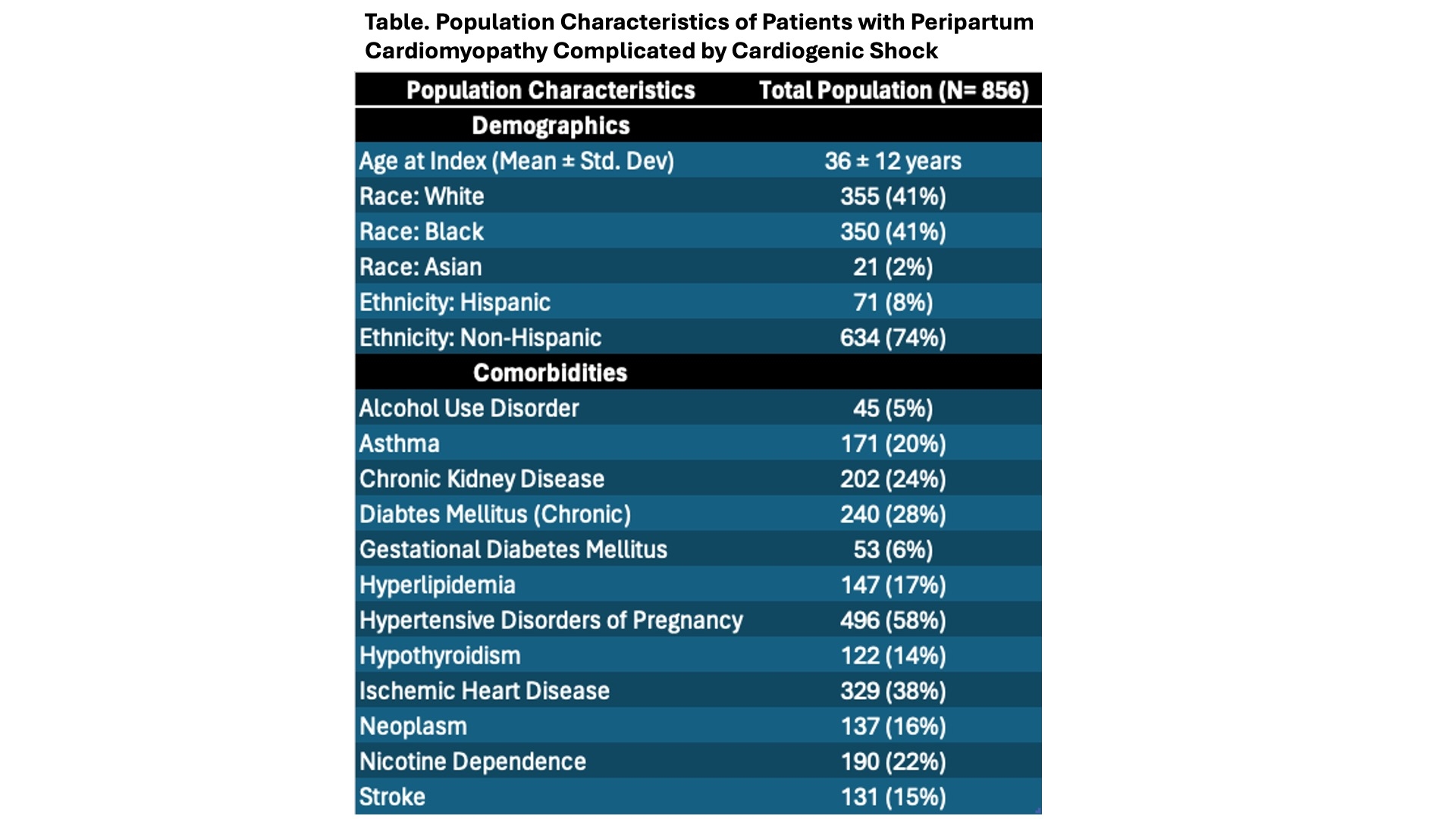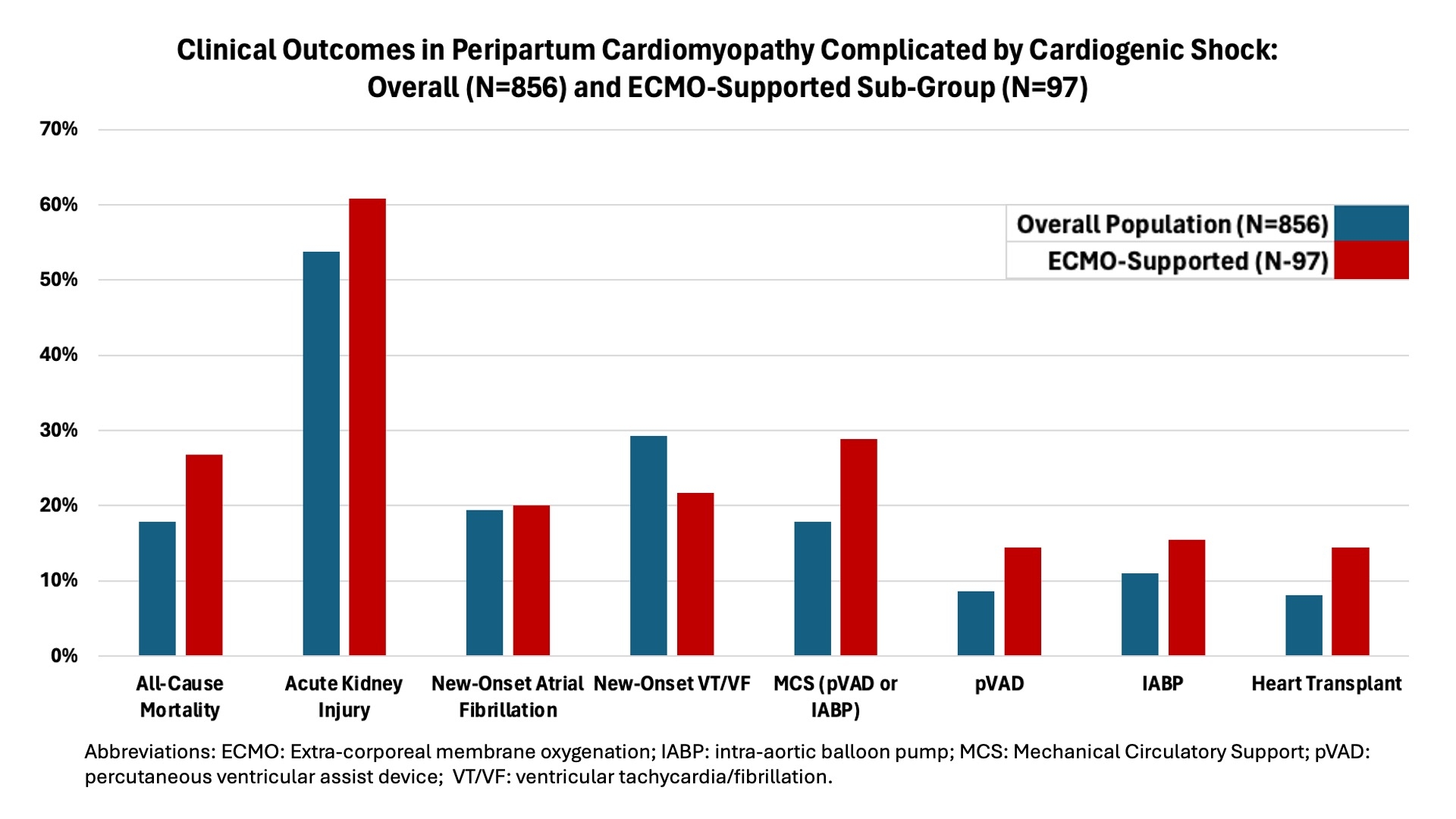Final ID: Su2141
Clinical Outcomes in Peripartum Cardiomyopathy Complicated by Cardiogenic Shock: A Retrospective Multi-Center Cohort Study
Abstract Body (Do not enter title and authors here): Introduction:
Peripartum cardiomyopathy (PPCM) is the leading cause of late postpartum pregnancy-related death and often precipitates acute heart failure and cardiogenic shock. Limited contemporary data exists on long-term outcomes among PPCM patients who develop cardiogenic shock (PPCM-CS), especially those who require extra-corporeal membrane oxygenation (ECMO).
Methods:
This retrospective cohort study identified patients with PPCM-CS from January 2012-January 2024, using EHR-based data from academic medical centers across the US (TriNetX, Inc.). The primary outcome was all-cause mortality over a 180-day follow-up period. Secondary outcomes included acute kidney injury (AKI), new-onset atrial fibrillation (AF), ventricular tachycardia/fibrillation (VT/VF), mechanical circulatory support (MCS), and heart transplantation (HT). The outcomes were reported in the overall population and among those requiring ECMO support.
Results:
We identified 856 females (mean age 36 ± 12 years; 41% White, 41% Black individuals) with PPCM-CS (Table). During a mean follow-up of 144 ± 63 days, all-cause mortality occurred in 17.9%. There were high incidences of AKI (53.7%), AF (19.4%), and VT/VF (29.3%) (Fig 1). 8.1% of patients successfully underwent HT. There was substantial MCS use, with percutaneous ventricular assist device (pVAD) used in 8.7% and intra-aortic balloon pump (IABP) used in 11.0%. Among those requiring ECMO (N=97, 11.3%), there was high all-cause mortality (26.8%). The concomitant use of pVAD and IABP was 14.4% and 15.5%, respectively. 14.4% of ECMO-supported patients underwent successful HT.
Conclusion:
This study provides insights into long-term clinical outcomes among patients with PPCM-CS, highlights those requiring ECMO support. Further investigation is needed for early disease recognition and to establish optimal utilization of MCS to improve outcomes in PPCM-CS.
Peripartum cardiomyopathy (PPCM) is the leading cause of late postpartum pregnancy-related death and often precipitates acute heart failure and cardiogenic shock. Limited contemporary data exists on long-term outcomes among PPCM patients who develop cardiogenic shock (PPCM-CS), especially those who require extra-corporeal membrane oxygenation (ECMO).
Methods:
This retrospective cohort study identified patients with PPCM-CS from January 2012-January 2024, using EHR-based data from academic medical centers across the US (TriNetX, Inc.). The primary outcome was all-cause mortality over a 180-day follow-up period. Secondary outcomes included acute kidney injury (AKI), new-onset atrial fibrillation (AF), ventricular tachycardia/fibrillation (VT/VF), mechanical circulatory support (MCS), and heart transplantation (HT). The outcomes were reported in the overall population and among those requiring ECMO support.
Results:
We identified 856 females (mean age 36 ± 12 years; 41% White, 41% Black individuals) with PPCM-CS (Table). During a mean follow-up of 144 ± 63 days, all-cause mortality occurred in 17.9%. There were high incidences of AKI (53.7%), AF (19.4%), and VT/VF (29.3%) (Fig 1). 8.1% of patients successfully underwent HT. There was substantial MCS use, with percutaneous ventricular assist device (pVAD) used in 8.7% and intra-aortic balloon pump (IABP) used in 11.0%. Among those requiring ECMO (N=97, 11.3%), there was high all-cause mortality (26.8%). The concomitant use of pVAD and IABP was 14.4% and 15.5%, respectively. 14.4% of ECMO-supported patients underwent successful HT.
Conclusion:
This study provides insights into long-term clinical outcomes among patients with PPCM-CS, highlights those requiring ECMO support. Further investigation is needed for early disease recognition and to establish optimal utilization of MCS to improve outcomes in PPCM-CS.
More abstracts on this topic:
Assessing the Clinical Impact of Cardiac Intensivists in Cardiac Intensive Care Units.: Results from the RESCUE registry
Bae Dae-hwan, Bae Jang-whan, Lee Junyoung, Sun Jonghee, Lee Sang Yeub, Yang Jeong Hoon, Gwon Hyeon-cheol
Cerebral Oxygen Saturation for Early Prognostication Following Veno-Arterial Extracorporeal Membrane OxygenationLi Yi, Geng Cong, Chen Nan, Chen Hui, Huang Jian, Lu Shiqi, Zhang Ke


